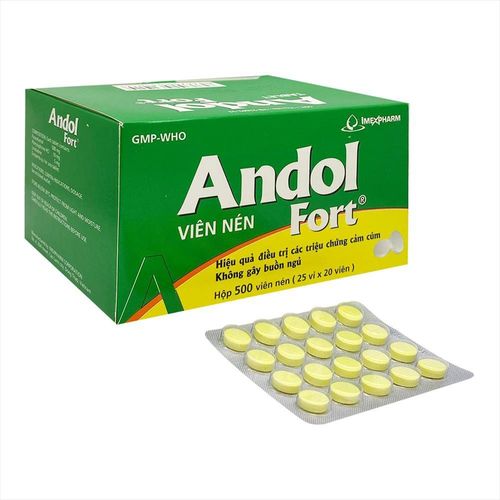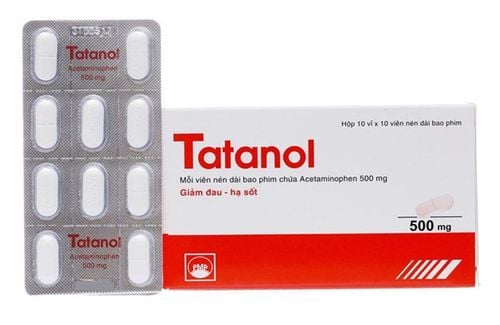This is an automatically translated article.
Acetra is manufactured and registered by Synmedic Laboratories Company, belongs to the group of pain relievers, antipyretics, non-Steroid anti-inflammatory drugs, drugs for treatment of Gout and osteoarthritis. Acetra is indicated for the treatment of moderate to severe pain.
1. What is Acetra drug?
Acetra medicine has the main ingredient containing Tramadol HCl with a content of 37.5mg and Acetaminophen with a content of 325mg. The drug is prepared in the form of film-coated tablets, packing box includes 10 blisters, 1 blister contains 10 tablets.
2. Indications of the drug Acetra
Acetra is indicated for use in the treatment of moderate to severe pain.3. Usage and dosage of Acetra
Usage of Acetra:
Acetra is prepared in the form of film-coated tablets, used orally. The drug is not affected by food, can be taken at any time. Take Acetra tablets whole, do not crush, chew or crush the medicine. Dosage of Acetra:
For adults and children > 12 years old: Maximum dose is from 1 to 2 tablets every 4 to 6 hours and should not exceed 8 tablets in 1 day. For children under 12 years old: There are no reports or studies on the effectiveness and safety of Acetra in this population. For the elderly > 65 years: There were no differences in the pharmacokinetic properties or safety of the drug in this population and in younger users. Overdose and handling:
When accidentally overdose, patients may experience symptoms of poisoning by 1 of the 2 main active ingredients or of both types. For Tramadol may experience symptoms such as coma, respiratory failure, convulsions, cardiac arrest and death. For Acetaminophen when used in high doses can lead to liver toxicity in some patients. Some early symptoms occur after the liver has been damaged such as loss of appetite, vomiting, nausea, gastrointestinal irritation, irritability, sweating, and paleness. 48-72 hours after taking the drug, symptoms of hepatotoxicity may appear.
4. Undesirable effects of the drug Acetra
During the use of Acetra, besides the therapeutic effects, patients may experience undesirable effects:
The most common side effects are: Dizziness, dizziness, nausea, drowsiness. . Less common side effects: Fatigue, asthenia, strong emotions, tremors, headache, constipation, indigestion, diarrhea, dry mouth, flatulence, vomiting, anxiety, loss of appetite, confusion , insomnia, irritability, restlessness, rash, itching, increased sweating. Rare side effects: Chills, chest pain, withdrawal syndrome, severe hypertension, hypertension, hypotension, convulsions, loss of balance, migraine, muscle tension, involuntary muscle contractions headache, severe migraine, confusion, paresthesia, dizziness, black stools due to gastrointestinal bleeding, dysphagia, tongue edema, tinnitus, palpitations, arrhythmia, tachycardia, liver tests abnormality, weight loss, loss of consciousness, forgetfulness, substance abuse, depression, hallucinations, impotence, mood swings, impotence, abnormal ideas, nightmares, anemia, trouble breathing, urinary disorders, albuminuria, urinary retention, little urine, abnormal vision. Some other side effects may also be encountered when using Tramadol such as: Urticaria, anaphylaxis, Stevens-Johnson syndrome, orthostatic hypertension, hepatitis, cognitive dysfunction, suicidal ideation. .
5. Acetra drug interactions
There may be an increased risk of side effects including Serotonin syndrome, seizures when Acetra is used concurrently with MAO inhibitors, Serotonin reuptake inhibitors. The metabolism of Tramadol may be significantly increased resulting in a decrease in the analgesic effect when Acetra is used concomitantly with Carbamazepine. The concentration of Tramadol is increased when taken with quinidine. Since an increased INR has been reported in some patients, periodic evaluation of the extrinsic clotting time should be performed when Acetra is co-administered with Warfarin. The metabolism of Tramadol is limited when Acetra is used with CYP2D6 inhibitors such as Paroxetine, Fluoxetine and Amitriptyline.
6. Note when using Acetra
Do not use Acetra on the following subjects:
Do not use for pregnant women and nursing mothers, because the safety of Acetra with infants and children has not been studied. Do not use for patients with a history of hypersensitivity to Tramadol, Acetaminophen or any of the excipients in Acetra. Caution when using Acetra:
Acetra can cause a risk of convulsions when used concurrently with TCAs (tricyclic compounds), SSRIs (serotonin reuptake inhibitors), sedatives, MAOIs, Opioids, drugs that lower the seizure threshold or in patients with a history of seizures, epilepsy should be used with caution. Caution should be exercised when high doses of Tramadol are administered with anesthetics, anesthetics, hypnotics, alcohol, or in patients at risk of respiratory depression. Acetra should be used with caution in patients with head trauma or in patients with increased intracranial pressure. May cause relapse, so caution should be exercised when Acetra is administered to patients with opiate addiction. The risk of hepatotoxicity may occur when Acetra is administered to patients with chronic alcoholism. In the treatment of Tramadol overdose, the use of Naloxone may increase the risk of convulsions in the patient. Do not exceed 2 tablets every 12 hours in patients with creatinine clearance < 30 ml/min. Use with caution in patients with severe hepatic impairment, do not use with other drugs containing Tramadol or Acetaminophen because of the risk of overdose.
7. Preservation of Acetra
Store Acetra in a cool, dry place, avoid direct exposure to sunlight or high temperature, because these agents can cause changes in the ingredients in the drug. Suitable storage temperature is below 30 degrees Celsius and keep out of reach of children.













